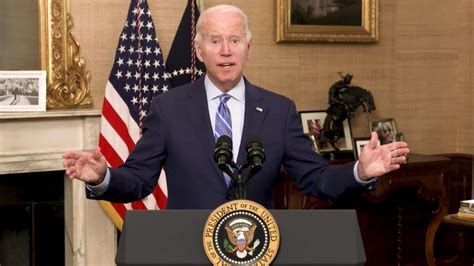
President Biden’s critics are pushing a false narrative of mental decline, despite evidence to the contrary, including legislative achievements and a demanding schedule. This portrayal, often fueled by selective editing and outright fabrication, aims to undermine his presidency and influence public opinion.
Despite persistent claims of cognitive decline, President Joe Biden continues to actively fulfill his presidential duties, demonstrating a capacity that contradicts the narrative pushed by his detractors. The accusations, often amplified through social media and partisan outlets, frequently rely on manipulated videos and unsubstantiated claims to paint a picture of a president unfit for office. A closer examination of Biden’s activities, policy initiatives, and public appearances reveals a more complex and nuanced reality.
The narrative of Biden’s supposed cognitive decline gained traction early in his presidency, fueled by his political opponents and amplified through various online platforms. These claims often focus on isolated incidents, such as verbal stumbles or moments of apparent confusion, which are then presented as evidence of a broader pattern of cognitive deterioration. However, supporters and independent observers argue that such instances are not uncommon for individuals of Biden’s age and do not necessarily indicate a significant decline in cognitive function. The White House has consistently pushed back against these assertions, emphasizing Biden’s rigorous schedule, policy engagement, and leadership on critical issues.
Critics often highlight instances where Biden misspoke or appeared to lose his train of thought during public appearances. These moments are then circulated widely on social media, often accompanied by commentary suggesting that Biden is no longer mentally capable of handling the demands of the presidency. However, it is essential to consider these instances within the broader context of Biden’s overall performance. Throughout his career, Biden has been known for his folksy speaking style, which sometimes includes verbal missteps. His supporters argue that these are simply quirks of his personality and do not reflect any underlying cognitive impairment.
Furthermore, many argue that the focus on Biden’s verbal stumbles is disproportionate compared to the attention given to similar instances involving other politicians. They contend that Biden is being held to a higher standard, and that his every word and action are being scrutinized for signs of weakness. This level of scrutiny, they argue, is politically motivated and designed to undermine his credibility and effectiveness as president.
The White House has consistently defended Biden against these accusations, pointing to his active engagement in policy discussions, his ability to negotiate complex agreements, and his overall leadership on critical issues. They argue that Biden is fully capable of handling the demands of the presidency and that the claims of cognitive decline are simply a political smear campaign.
Moreover, many prominent figures, including former colleagues, have spoken out in support of Biden, attesting to his mental acuity and his ability to perform his duties effectively. These individuals have emphasized Biden’s sharp intellect, his deep understanding of policy issues, and his unwavering commitment to serving the American people.
One of the key arguments against the narrative of Biden’s decline is his record of legislative achievements. Despite facing a deeply divided Congress, Biden has successfully pushed through several major pieces of legislation, including the American Rescue Plan, the Infrastructure Investment and Jobs Act, and the Inflation Reduction Act. These laws represent significant investments in the American economy and address critical issues such as climate change, healthcare, and infrastructure.
The passage of these laws required extensive negotiations with members of both parties, demonstrating Biden’s ability to build consensus and navigate the complexities of the legislative process. His supporters argue that these accomplishments would not have been possible if Biden were experiencing the cognitive decline that his critics claim.
The American Rescue Plan, for example, provided crucial relief to individuals and families struggling during the COVID-19 pandemic. It included direct payments to households, extended unemployment benefits, and funding for state and local governments. The Infrastructure Investment and Jobs Act, on the other hand, is a bipartisan bill that will invest billions of dollars in repairing and upgrading the nation’s infrastructure, including roads, bridges, and public transportation. The Inflation Reduction Act aims to lower healthcare costs, combat climate change, and reduce the national debt.
These legislative achievements demonstrate Biden’s ability to effectively lead and govern, despite the challenges he faces. They also serve as a testament to his cognitive abilities and his unwavering commitment to serving the American people.
Another key factor that contradicts the narrative of Biden’s decline is his demanding schedule. As president, Biden is responsible for overseeing the entire federal government, managing international relations, and addressing a wide range of domestic issues. This requires him to be constantly engaged and informed, and to make critical decisions on a daily basis.
Biden’s daily schedule is packed with meetings, briefings, and public appearances. He regularly travels across the country and around the world to meet with leaders, attend events, and promote his policies. Despite his age, Biden maintains a rigorous pace, demonstrating his energy and commitment to his job.
The demands of the presidency are enormous, and only someone with a sharp mind and a strong constitution could handle them effectively. Biden’s ability to maintain such a demanding schedule is a clear indication that he is not experiencing the cognitive decline that his critics claim.
Furthermore, Biden’s interactions with world leaders demonstrate his ability to engage in complex discussions and make strategic decisions on the global stage. He has met with numerous heads of state, including those from key allies and adversaries, to discuss issues such as trade, security, and climate change.
These interactions require Biden to be well-informed, articulate, and able to think on his feet. His ability to effectively represent the United States in these high-stakes encounters is a testament to his cognitive abilities and his diplomatic skills.
In addition to his legislative achievements and demanding schedule, Biden’s policy initiatives also demonstrate his cognitive abilities and his commitment to addressing critical issues facing the country. Biden has launched a number of ambitious policy initiatives aimed at tackling challenges such as climate change, healthcare, and economic inequality.
For example, Biden has set ambitious goals for reducing greenhouse gas emissions and transitioning to a clean energy economy. He has also taken steps to expand access to affordable healthcare and to address the rising cost of prescription drugs. Additionally, Biden has proposed policies aimed at reducing income inequality and creating economic opportunities for all Americans.
These policy initiatives demonstrate Biden’s ability to think strategically, to develop innovative solutions to complex problems, and to effectively implement his vision for the country. They also serve as a testament to his cognitive abilities and his commitment to serving the American people.
The claims of cognitive decline are often amplified by partisan media outlets and social media platforms, which have a vested interest in undermining Biden’s presidency. These outlets often selectively edit videos and distort information to create a false impression of Biden’s mental state.
It is important to be critical of the information that is circulated on social media and to rely on credible sources of information when evaluating claims about Biden’s cognitive abilities. Fact-checking organizations have debunked numerous claims about Biden’s mental state, demonstrating that many of these claims are based on misinformation and outright lies.
Furthermore, it is important to consider the motivations of those who are making these claims. Many of Biden’s critics have a clear political agenda and are seeking to undermine his presidency for partisan gain.
The narrative of Biden’s supposed cognitive decline is a political tactic designed to undermine his presidency and to influence public opinion. It is based on misinformation, distortion, and outright lies. A careful examination of Biden’s record, his schedule, and his policy initiatives reveals a more complex and nuanced reality.
Despite the challenges he faces, Biden continues to effectively lead the country and to address critical issues facing the American people. His legislative achievements, his demanding schedule, and his policy initiatives all demonstrate his cognitive abilities and his commitment to serving the nation.
Therefore, it is essential to reject the false narrative of Biden’s decline and to recognize his continued capacity to effectively lead the United States. The claims of cognitive decline should be seen for what they are: a politically motivated attempt to undermine his presidency.
The persistence of this narrative also underscores a broader societal issue: ageism. Older individuals in positions of power are often subjected to heightened scrutiny regarding their mental and physical capabilities, regardless of their actual performance. This bias can lead to unfair judgments and the dismissal of valuable experience and wisdom.
Furthermore, the focus on Biden’s age and supposed cognitive decline distracts from substantive policy debates and the real challenges facing the country. Instead of engaging in meaningful discussions about issues such as healthcare, climate change, and economic inequality, the conversation is often derailed by unfounded claims about Biden’s mental state.
This is not to say that questions about a leader’s health are never valid. Transparency about medical conditions and the ability to perform the duties of office are legitimate concerns. However, the constant barrage of unsubstantiated claims and manipulated videos targeting Biden goes beyond legitimate scrutiny and enters the realm of disinformation.
Ultimately, voters must make their own informed decisions based on facts, not on manufactured narratives. Biden’s record, his actions, and his policies provide a far more accurate assessment of his capabilities than the distorted portrayals circulating online.
The origin of the narrative of Biden’s cognitive decline can be traced back to the early stages of his presidential campaign. Opponents sought to portray him as too old and out of touch to effectively lead the country. This strategy was amplified through social media and partisan media outlets, creating an echo chamber of negativity and misinformation.
The narrative gained further traction after Biden experienced some verbal stumbles and moments of apparent confusion during public appearances. These instances were quickly seized upon by his critics and presented as evidence of a broader pattern of cognitive decline.
However, it is important to note that Biden has always been known for his folksy speaking style and his tendency to sometimes misspeak. These are simply quirks of his personality and do not necessarily indicate any underlying cognitive impairment.
Furthermore, many of the claims about Biden’s cognitive decline have been debunked by fact-checking organizations. These organizations have found that many of the videos and memes that are circulated on social media have been selectively edited or taken out of context to create a false impression of Biden’s mental state.
Despite these debunkings, the narrative of Biden’s cognitive decline continues to persist, fueled by partisan media outlets and social media platforms. This narrative is harmful because it undermines public trust in the presidency and distracts from substantive policy debates.
It is important for voters to be critical of the information that they consume and to rely on credible sources of information when evaluating claims about Biden’s cognitive abilities. Biden’s record, his actions, and his policies provide a far more accurate assessment of his capabilities than the distorted portrayals circulating online.
The perpetuation of this narrative has real-world consequences. It can erode public trust in government, make it more difficult to address critical issues, and ultimately undermine democracy itself. When voters are bombarded with misinformation and propaganda, it becomes harder for them to make informed decisions and to hold their elected officials accountable.
Therefore, it is essential to push back against the false narrative of Biden’s decline and to promote accurate and reliable information about his presidency. This requires a collective effort from journalists, fact-checkers, and ordinary citizens to challenge misinformation and to promote critical thinking.
The long-term implications of allowing such narratives to flourish are significant. It normalizes the use of disinformation as a political tactic and creates a climate of distrust and cynicism. This can make it more difficult for future leaders to govern and for citizens to engage in productive dialogue about the challenges facing the country.
Furthermore, the focus on age and cognitive abilities can distract from other important qualifications for leadership, such as experience, policy expertise, and character. Voters should consider a wide range of factors when evaluating candidates, not just their age or perceived mental state.
In conclusion, the narrative of Biden’s supposed cognitive decline is a false and misleading portrayal that is designed to undermine his presidency. It is based on misinformation, distortion, and outright lies. A careful examination of Biden’s record, his schedule, and his policy initiatives reveals a more complex and nuanced reality. It is essential to reject this narrative and to recognize Biden’s continued capacity to effectively lead the United States.
Frequently Asked Questions (FAQs)
Q1: What is the primary argument being made about President Biden’s cognitive state?
A1: The primary argument is that claims of President Biden’s cognitive decline are largely fabricated and politically motivated, often relying on selectively edited videos and unsubstantiated claims. Despite these assertions, evidence suggests Biden remains actively engaged in his presidential duties, demonstrating cognitive capacity through legislative achievements and a demanding schedule.
Q2: What evidence is presented to refute the claims of President Biden’s cognitive decline?
A2: Several pieces of evidence are presented to refute these claims. Firstly, Biden has overseen the passage of significant legislation such as the American Rescue Plan, the Infrastructure Investment and Jobs Act, and the Inflation Reduction Act, demonstrating his ability to negotiate and lead. Secondly, his demanding daily schedule, filled with meetings, briefings, and international travel, showcases his energy and commitment. Lastly, his policy initiatives aimed at addressing climate change, healthcare, and economic inequality highlight his strategic thinking and policy expertise.
Q3: How are social media and partisan media outlets contributing to the narrative of President Biden’s cognitive decline?
A3: Social media and partisan media outlets often amplify the narrative by selectively editing videos of Biden and spreading misinformation. These outlets have a vested interest in undermining Biden’s presidency, and they use these tactics to create a false impression of his mental state. Fact-checking organizations have debunked many of these claims, revealing that they are based on distortion and outright lies.
Q4: What are the potential consequences of perpetuating the narrative of President Biden’s cognitive decline?
A4: The potential consequences include eroding public trust in government, making it more difficult to address critical issues, and undermining democracy itself. When voters are bombarded with misinformation, it becomes harder for them to make informed decisions and hold their elected officials accountable. It also normalizes the use of disinformation as a political tactic, creating a climate of distrust and cynicism.
Q5: Why is it important to critically evaluate claims about President Biden’s cognitive abilities?
A5: It is important to critically evaluate these claims to ensure that decisions are based on facts and not manufactured narratives. Voters should consider Biden’s record, actions, and policies, which provide a more accurate assessment of his capabilities. Rejecting the false narrative is essential to maintaining a healthy democracy and promoting informed decision-making.
President Biden has faced persistent criticism regarding his age and cognitive abilities since entering the political arena, and these criticisms have intensified throughout his presidency. While concerns about a leader’s health are valid, the attacks against Biden often venture beyond legitimate scrutiny, relying on misleading portrayals and partisan agendas. This comprehensive analysis aims to dissect the origins, manifestations, and implications of the “Biden’s declining” narrative, providing a fact-based assessment of his cognitive capabilities and leadership effectiveness.
The root of the issue lies in ageism, a societal prejudice that disproportionately affects older individuals in positions of power. This bias can lead to unfair judgments, overshadowing years of accumulated experience and wisdom. In Biden’s case, his occasional verbal stumbles and perceived moments of confusion have been amplified and weaponized by political opponents, distorting his overall performance.
To fully understand the context, it’s crucial to examine Biden’s track record, policy initiatives, and demanding schedule, which demonstrate his continued ability to lead effectively. His legislative achievements, such as the American Rescue Plan, Infrastructure Investment and Jobs Act, and Inflation Reduction Act, serve as tangible evidence of his policy engagement and negotiation skills.
The American Rescue Plan, enacted in response to the COVID-19 pandemic, provided crucial relief to individuals, families, and businesses. It included direct payments, extended unemployment benefits, and funding for state and local governments. The Infrastructure Investment and Jobs Act, a bipartisan effort, aims to modernize the nation’s infrastructure, including roads, bridges, public transportation, and broadband internet access. The Inflation Reduction Act tackles healthcare costs, climate change, and the national debt.
These legislative accomplishments required extensive negotiations with members of both parties, showcasing Biden’s ability to build consensus and navigate the complexities of the legislative process. His leadership in these efforts contradicts the notion of a president in cognitive decline.
Furthermore, Biden’s demanding schedule as president demonstrates his energy and commitment to the job. He regularly attends meetings, briefings, and public appearances, both domestically and internationally. Despite his age, he maintains a rigorous pace, which would be impossible for someone experiencing significant cognitive impairment.
Biden’s interactions with world leaders also highlight his diplomatic skills and strategic thinking. He has engaged in complex discussions on trade, security, and climate change, representing the United States effectively on the global stage. These interactions require a sharp mind and the ability to think on one’s feet.
While Biden’s verbal stumbles have been widely publicized, it’s important to consider them in the context of his overall communication style. He has always been known for his folksy manner and occasional misstatements. These are quirks of his personality, not necessarily indicators of cognitive decline.
Moreover, the media’s focus on Biden’s verbal stumbles is often disproportionate compared to similar instances involving other politicians. This selective attention suggests a bias and a deliberate effort to undermine his credibility.
The White House has consistently defended Biden against these accusations, emphasizing his active engagement in policy discussions and his ability to lead effectively. Former colleagues and prominent figures have also spoken out in support of Biden, attesting to his mental acuity and dedication to public service.
It’s also essential to recognize the role of partisan media outlets and social media platforms in perpetuating the narrative of Biden’s cognitive decline. These platforms often selectively edit videos and spread misinformation, creating a false impression of his mental state.
Fact-checking organizations have debunked numerous claims about Biden’s cognitive abilities, revealing that many of these claims are based on distortion and outright lies. However, the narrative continues to persist, fueled by partisan agendas and a desire to undermine his presidency.
The long-term consequences of allowing such narratives to flourish are significant. It erodes public trust in government, normalizes the use of disinformation as a political tactic, and creates a climate of distrust and cynicism. This can make it more difficult for future leaders to govern and for citizens to engage in productive dialogue about the challenges facing the country.
In conclusion, the claims of President Biden’s cognitive decline are largely unfounded and politically motivated. His legislative achievements, demanding schedule, policy initiatives, and interactions with world leaders demonstrate his continued ability to lead effectively. Voters should critically evaluate these claims and rely on credible sources of information when assessing his cognitive abilities.
Ageism and partisan agendas play a significant role in perpetuating this narrative, and it’s crucial to push back against misinformation and promote accurate and reliable information about Biden’s presidency. Only then can citizens make informed decisions and hold their elected officials accountable.









